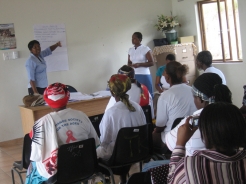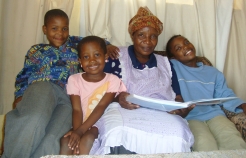The World Cup culminates this week and thousands of football fans will leave South Africa. But as the memory of their trip fades, the country’s problems will remain as sharp as ever.
South Africa has one of the highest numbers of people living with HIV in the world. An estimated 5.7 million people in the country live with HIV.
HIV campaigns and services not aimed at older people
 Since 2008, we have been working with our partner, the Muthande Society for the Aged (MUSA), to train traditional health practitioners in HIV prevention and care.
Since 2008, we have been working with our partner, the Muthande Society for the Aged (MUSA), to train traditional health practitioners in HIV prevention and care.
They are now better equipped to advise the many older people who consult them.
National HIV prevention campaigns and HIV services are typically aimed at younger adults, so many older people are uneducated about HIV and AIDS-related issues. Their lack of knowledge not only increases their own risk of becoming infected, it also stops them from educating the children in their care.
And in eastern and southern Africa, it is estimated that between 40 and 60% of children orphaned as a result of AIDS are cared for by an older person.
Reaching traditional health practitioners
In KwaZulu-Natal – the South African province worst-hit by HIV and AIDS – there are around 25,000 traditional health practitioners. They are often the first port of call for older people seeking medical advice.
Through a Big Lottery-funded project, we are working with practitioners in the province to improve their knowledge so they can give appropriate advice to older people and refer them or their relatives to clinics or other health services where necessary.
Makhosazana took her daughter to a traditional health practitioner trained by MUSA.
 Makhosazana Shinga (pictured right) is 73 and shares her home with her seven unmarried children and seven grandchildren.
Makhosazana Shinga (pictured right) is 73 and shares her home with her seven unmarried children and seven grandchildren.
Her 35-year-old daughter fell ill two years ago, suffering from coughing fits and boils. Makhosazana took her to a traditional health practitioner who had been trained by MUSA.
She said: “The health practitioner tried some therapies but they did not get rid of the boils immediately, so he referred me to the clinic to see if they could help.
“After various tests, we discovered she was HIV positive. Her long coughing fits were a result of TB. The clinic immediately started her on TB treatment and on anti-retroviral drugs.”
Learning about prevention, transmission and safe practice
Twice a month, traditional health practitioners come to one of MUSA’s six older people’s service centres in KwaZulu-Natal.
They learn about the transmission and prevention of HIV and are taught how to practice safely, by washing their hands, wearing rubber gloves, sterilising equipment and disposing of objects used to pierce the skin.
They are trained to spot possible symptoms of HIV and made aware of the need for older patients to know their own HIV status.
They are also shown how to correctly measure out accurate dosages of the traditional medicines they administer.
“The key to tackling HIV and AIDS is good information”
Makhosazana said the key to tackling HIV and AIDS is getting good information, talking about it and being open.
She said: “After getting further advice from my traditional health practitioner my daughter has since taken her 15-year-old boy and 11-year-old girl for HIV testing. Fortunately both results came back negative.
“I have been taught the importance of being open with my children and grandchildren. I tell them to protect themselves, their friends and boyfriends.
“My children and grandchildren are the reason I get up every day. I love them enough to talk about HIV and AIDS. But still, nothing prepares you for when HIV strikes in your own back yard.”
